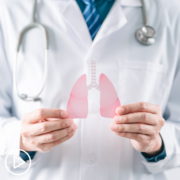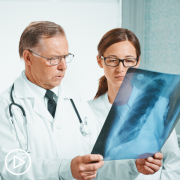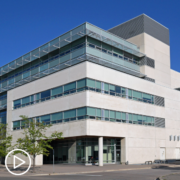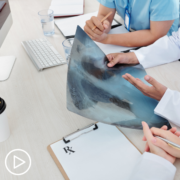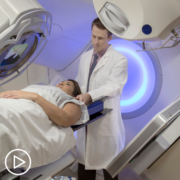Advancements in Lung Cancer Clinical Trials | Updates for Veterans
Advancements in Lung Cancer Clinical Trials: Updates for Veterans from Patient Empowerment Network on Vimeo.
How can veterans help move lung cancer clinical trial advancements forward? Expert Dr. Drew Moghanaki from UCLA Health explains clinical trial groups that need more participants, available support resources for veterans, and patient advice.
[ACT]IVATION TIP
“…speak up and ask if there is a clinical trial that you may be eligible for to help another veteran. And, of course, when you enroll in a trial, you’ll be getting basically the best treatments that we think are available at this time.”
Download Resource Guide | Descargar guía de recursos
See More from [ACT]IVATED NSCLC Veterans
Related Resources:
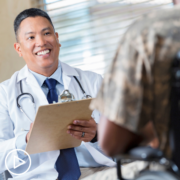
Combating Disparities: Veterans’ Healthcare Access and Quality |
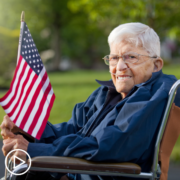
|
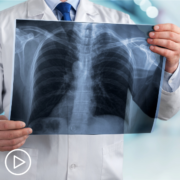
Veteran Lung Cancer Risk | Understanding Exposures and Screening Protocols |
Transcript:
Lisa Hatfield:
Dr. Moghanaki, can you speak to ongoing clinical trials and research specifically for veterans? And are there any clinical trials or research studies available that focus on lung cancer treatments specifically tailored to veterans from underrepresented communities?
Dr. Drew Moghanaki:
Yeah. So we want to focus on the people we care about the most, which for many of us are veterans, but at the end of the day, partnering nationally and globally in clinical trials is probably the best thing that we can do. We don’t really think that the lung cancer is…that our veterans are dealing with is necessarily different than what a civilian may be. So by partnering, we have bigger scale to tackle these problems and get these studies done as quickly as possible.
When it comes to underserved communities, same thing. We do the VA and VA researchers definitely make a point of trying to get more underrepresented communities access to clinical trials. But again, we just usually geographic challenges are our biggest barrier. Someone wants to live in this beautiful part of the country up in a mountainside near a lake, but they’re two-and-a-half hours away from a city. That can be challenging for us.
But the good news is that the VA does provide a lot of housing. So for those veterans who live far away, if they want to come, we’ll take care of them. We’ll provide, if they’re eligible for your VA healthcare, we’ll provide them housing. We can even provide them with their meals. And so, and get them access to the best care. So basically my activation tip here is to be aware that clinical trials are really critical.
It’s how we’ve moved forward. It’s a tremendous opportunity to help other veterans behind themselves who will get lung cancer in the future. There’s nothing we can do at this time to stop the number of people getting lung cancer. And so the more research we can do, the better this world can be. And my activation tip is to speak up and ask if there is a clinical trial that you may be eligible for to help another veteran. And, of course, when you enroll in a trial, you’ll be getting basically the best treatments that we think are available at this time.
Lisa Hatfield: Great. Thank you. Thank you so much. Those activation tips were really great and patient-centered. And I think that’s what, at least me as a patient, watching that in the audience, that’s what I want to hear is what can I do to help advocate for myself? So thank you for those responses.
Share Your Feedback
Create your own user feedback survey

